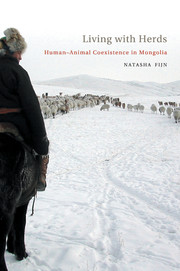Book contents
- Frontmatter
- Contents
- Lists of Plates, Figures, Maps, Tables, and Online Video Segments
- Glossary
- Acknowledgments
- LIVING WITH HERDS
- PART ONE CROSSING BOUNDARIES
- PROLOGUE: LIFE IN THE KHANGAI MOUNTAINS
- 1 INTRODUCTION
- 2 A MONGOLIAN ETHO-ETHNOGRAPHY
- PART TWO THE SOCIAL HERD
- PART THREE LIVING WITH HERDS
- Appendix
- References
- Index
- Plate section
1 - INTRODUCTION
from PART ONE - CROSSING BOUNDARIES
Published online by Cambridge University Press: 03 May 2011
- Frontmatter
- Contents
- Lists of Plates, Figures, Maps, Tables, and Online Video Segments
- Glossary
- Acknowledgments
- LIVING WITH HERDS
- PART ONE CROSSING BOUNDARIES
- PROLOGUE: LIFE IN THE KHANGAI MOUNTAINS
- 1 INTRODUCTION
- 2 A MONGOLIAN ETHO-ETHNOGRAPHY
- PART TWO THE SOCIAL HERD
- PART THREE LIVING WITH HERDS
- Appendix
- References
- Index
- Plate section
Summary
The focus of this book is on the processes of animal domestication, not in a historical sense but within a current hybrid community, that of Mongolian herders and the herd animals they live amongst. In the chapters to follow I investigate social behaviour between humans and other animals as a key component in this process. I emphasise both sides of the human–animal relationship by examining their reciprocal social behaviour and communication with one another. I engage not only with how herd animals have an influence upon Mongolian herders' lives, but with the herd animals themselves as individual agents, as an active part of the community.
Herding is a way of life for a large proportion of the people in Mongolia and has existed for over 5,000 years in the Eurasian grassland–steppe environment. Anthropologists, geographers, historians, explorers, journalists, and travel writers have previously documented Mongolian society; nonetheless, I am unaware of any other work written in English that has examined the importance of herd animals, specifically ungulates, to nomadic pastoralists of Mongolia. In this chapter, I describe what the term “domestication” means to Mongolian herders and within the academic sphere, as well as my own definition of a domestic animal for the purposes of this book. I provide a background to the literature on the domestication of the animals that Mongolians herd and a brief historical account of herding life in Mongolia.
- Type
- Chapter
- Information
- Living with HerdsHuman-Animal Coexistence in Mongolia, pp. 17 - 35Publisher: Cambridge University PressPrint publication year: 2011



